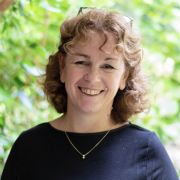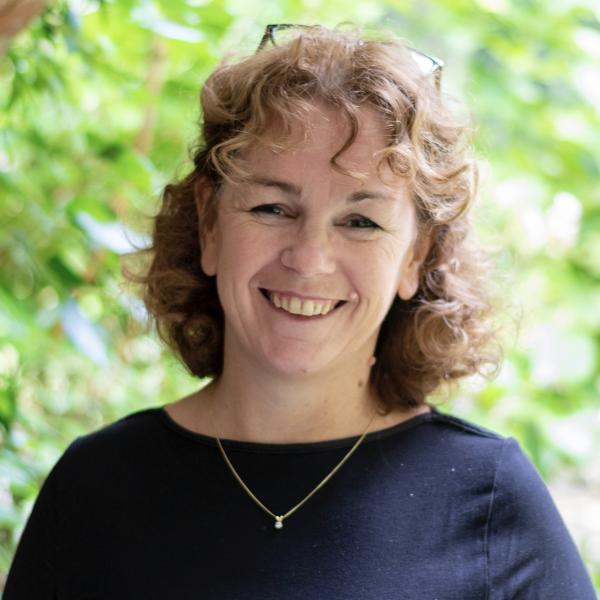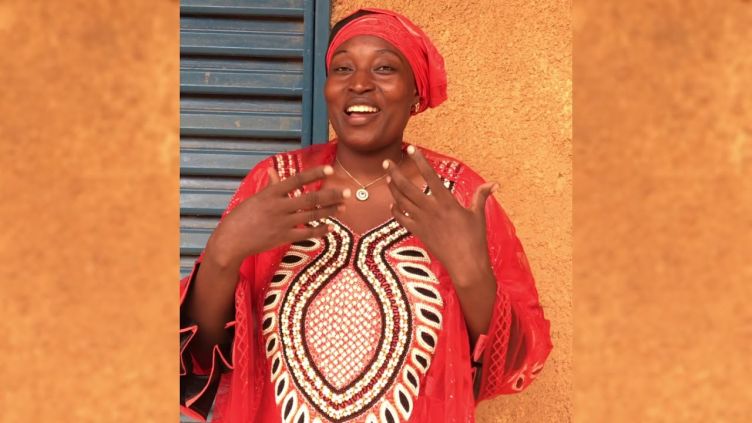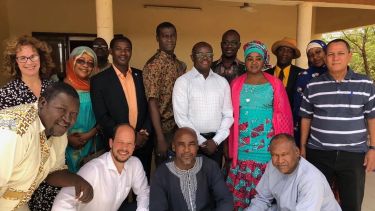FemmepowermentAfrique: a research case study
West Africa remains blighted by poverty and inequality. With limited internet access and literacy, radio is the most powerful medium for effecting social change. Dr Emma Heywood of the School of Journalism, Media & Communication is playing a key role: in women's empowerment and now tackling Covid-19
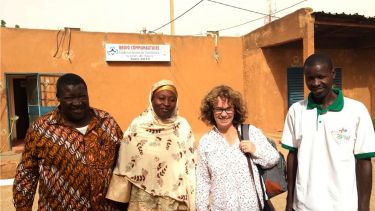
Some of the harshest economic and social conditions in the world are experienced in west Africa. The postcolonial era has been blighted by political instability and civil war. Poor healthcare, low levels of education, a lack of infrastructure and inefficient agriculture are all ongoing problems. Despite the presence of major developed cities like Accra, Lagos and Dakar, local economies remain significantly subsistence-based, and poverty afflicts many of the region's 380 million people.
As with human societies the world over, west Africa also sees widespread gender inequality. Young girls are often married without their consent to older men and have no access to birth control. Women are overwhelmingly excluded from positions of influence. The issue is not that they choose passivity (many operate small businesses from their homes) but that they lack reliable information – about their legal rights, and about the position of women more widely.
This stems in large part from limited access to electricity, which makes TV and the internet a non-starter for vast swathes of the population. In any case, levels of literacy are similarly low – more than half of girls in Niger don't complete primary school – and so printed media, too, becomes unviable as a means to women's empowerment. This combination of circumstances means the most powerful mass communication medium in the region is very often radio. Battery-powered sets can be listened to communally, by many members of a community.
We found out what they wanted, we undertook a content analysis of radio programming, and worked out what information was being broadcasted. We also spoke to the radio stations to see how much they knew about their audiences and the terminology they were using around women on their shows
Dr Emma Heywood
FemmepowermentAfrique project lead
It's for this reason that Studio Kalangou started, in 2016, to create programming which is now broadcast across Niger by a network of 45 local stations for two hours every day. The show includes civic education material, magazine-style content about the daily lives of Nigeriens, and extensive debate and discussion around current issues. The programme is produced by journalists based in the capital, Niamey, in collaboration with a team of correspondents across the country.
Credible and impartial
Studio Kalangou was established by Fondation Hirondelle – a Switzerland-based non-governmental organisation (NGO) which aims to empower people in troubled areas by providing them with credible and impartial information.
In any project of this kind, evaluation is paramount. All stakeholders will be keen to know how worthwhile their various kinds of investments have been. To gauge the effectiveness of Studio Kalangou's work, an expert was needed. Enter Dr Emma Heywood of the School of Journalism, Media and Communication at the University of Sheffield.
Emma had previously been funded by the British Academy to research community radio in the West Bank. Her field work in the occupied Palestinian territories looked at NGO-related broadcasts and their potential to strengthen a sense of local community and offer an important communication channel to marginalised people. This made her an ideal candidate to assess the impact of the broadcasts in Niger – and her project FemmepowermentAfrique was born.
Focus groups
Alongside her team of research assistants, Emma listens to the responses of Kalangou's audience and analyses the findings. But at the project's outset, it was first necessary to audit existing programming – and ask women listeners what it was they needed from radio.
She says: "We asked the women in the focus groups what they thought empowerment was, what the point of it was, what programmes they wanted on the radio, what would help them, et cetera. Some of the women said they’d like financial information and to understand how to set up a business. Some wanted light-hearted information and things like ‘how to keep our husbands’, so they wouldn’t get a second wife.
"We found out what they wanted, we undertook a content analysis of radio programming, and worked out what information was being broadcasted. We also spoke to the radio stations to see how much they knew about their audiences and the terminology they were using around women on their shows."
The project team have used a variety of methods to share their findings beyond the world of academia. In 2018 FemmepowermentAfrique and Studio Kalangou ran a workshop looking at the impact of radio on women's rights and empowerment in Niger. The event brought together journalists and advocates at the radio studio, and Emma gave a presentation about her project, placing the work in clear view of the frontline media workers and civil society figures with the most significant stake in the outcome.
In 2019 Emma visited Brussels for two events which offered further opportunities to disseminate the work being undertaken by her team. The first was a gathering mostly of delegates to the European Union's Africa Working Party (COAFR). These are EU policymakers who are highly informed on west African politics and gender relations, but who were not necessarily versed in the potential of radio to empower women and improve lives.
Then representatives from many non-governmental organisations (NGOs) – Search for Common Ground, Quaker Council for European Affairs, Christian Solidarity Worldwide, International Crisis Group, Global Forum for Media Development, European Peacebuilding Liaison Office, and more – converged on Fondation Hirondelle's office in the Belgian capital, along with senior figures from the EU and European Commission.
Both events in Brussels gave Emma a chance to put her findings into the purview of those in a position to put them to good use – demonstrating the importance of real-world impact to the FemmepowermentAfrique project as a whole.
Fighting Covid-19 misinformation
This commitment to helping make a palpable improvement to lives means FemmepowermentAfrique has been able to expand its activities.
First, support from UK Research and Innovation's Global Challenges Research Fund enabled Emma to extend the work from Niger to incorporate radio in Mali and Burkina Faso. In a sign of the project's commitment to innovative methodologies, this phase of activity introduced the use of natural language processing – a form of artificial intelligence – for analysis of the radio broadcasts, and WhatsApp surveys for feedback from listeners.
Then in May 2020 the global humanitarian charity Elrha awarded a grant which supported the project to use radio and social media to address misinformation about Covid-19 in Burkina Faso, where internal conflict has created a humanitarian crisis resulting in hundreds of thousands of people being displaced from their homes.
The FemmepowermentAfrique team
Project lead
Dr Emma Heywood is a Lecturer in Journalism, Politics and Communication at the University of Sheffield. Her research focuses on the role of the media, and particularly radio, in conflict-affected areas. She is course leader on the University's Global Journalism MA.
Research assistants
Dr Beatrice Ivey's research interests include the cultural memory of French colonialism, postcolonial feminist studies, and French-language cultural production.
Mariam Ouédraogo is about to finalise her masters thesis in Communication for Development. Her research interests include behavioural change through communication and the role of communication in socio-economic development of marginalized populations.
Mossokoura Konate is a Malian journalist and Head of Radio Partners for Studio Tamani in Bamako. In this role, she manages broadcasts across 85 partner radios across Mali. She has a masters degree in Media Management.
Haoua Issoufou Maikano has a BA in Strategic Communications from the African University College of Communications (Aucc) which is based in Accra, Ghana.
This situation has been exacerbated by the spread of the virus, and public education campaigns about the pandemic are being undermined by misinformation. The researchers are collecting data on the rumours and information circulating in camps and host communities, then fact-checking each item and disseminating accurate material via local radio broadcasts.
Emma says: "Burkina Faso has one of the highest growing rates of IDPs [internally displaced persons] in the world and it’s been missed. It’s being hidden. But there are 1.2 million IDPs in the country and they aren’t being given sufficient factual information that is accurate. So our aim is to find out what better information they can be given with regard to Covid-19.
"We need to make sure they get the information they want, in a format that makes it accessible. Accessibility is key. Some people don’t have radios so Fondation Hirondelle, through another grant, has provided some areas with solar-powered radios and with megaphones to broadcast information."
Lasting impact
For Emma it's not enough to extract data and depart from the field without taking care over the lasting impact of the project. Scholarly publications will share the findings of FemmepowermentAfrique with the research community, and Emma's findings and analysis will be published in her forthcoming book Radio and Women’s Empowerment (Palgrave). But the ultimate aim is to ensure lives are changed for the better – and empowerment means giving people the means and understanding to initiate and drive change for themselves.
As Emma explains: "We ran workshops at the end of the Mali and Niger projects and fed back to the participants to inform them what has changed and what will continue to change.
"It was so important to say: 'This is what has changed and this is why your voice has been so important. This has changed because you said it.'"
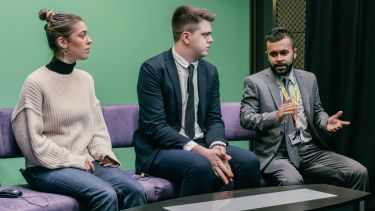
Our outstanding reputation for journalism
We're ranked as one of the top 5 universities to study journalism in the Guardian and the Complete University Guide - we're also 1st in the Russell Group for learning resources, student voice and learning opportunities according to the National Student Survey.

